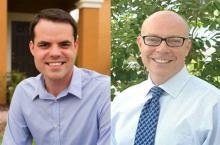
With the U.S. Supreme Court considering same-sex marriage, President Barack Obama re-elected on a platform that included it, and the first openly gay lawmakers taking their seats in Tallahassee, gay voters say it’s been a winning year.
“We’ve made a lot of progress, but we still have a long way to go,” said Rep. David Richardson, a Miami Beach Democrat, and one of two openly gay lawmakers elected this year – the first in Florida’s Legislature.
The 2012 election saw Florida become one of seven states to break that barrier. Nationwide, lesbian, gay, bisexual or transgender candidates were elected to the U.S. Senate and House, and dozens to state legislatures.
Richardson, a 55-year-old forensic accountant, credits redistricting and the open seat in House District 113 for his win. He said that for all the voters he met during the campaign, none asked him about his sexual orientation, although it was reported by local news media.
“In this area, people maybe don’t care so much about someone’s sexual orientation,” he said.
Richardson was sworn in on Nov. 20 along with Rep. Joe Saunders, an Orlando Democrat and the field director of Equality Florida, an LGBT advocacy group. Saunders had led the 2008 campaign against Florida’s Amendment 2, the constitutional amendment banning same-sex marriage and civil union, which passed 62 percent to 38 percent.
The swearing-in was memorable for Susan Gage, too. Now a massage therapist and LGBT activist, Gage was for 12 years a public radio reporter. She hadn’t been inside the Capitol since leaving that job – until the day of Saunders’ and Richardson’s swearing-in.
“Nobody questioned me when I fell in with the reporter pack to gain access to the House floor,” she blogged afterward. “I gave Joe a big, long hug, and promised him that the community was there to help him however he needed it.
“Such an amazing accomplishment as having out-and-proud members of the Florida House is a sign that ‘the times they-are-a-changin’.
“The number of times I would have to interview members of the Senate who were highly homophobic and the things that they would say to my face – I’d have to take it,” Gage said. “That was pretty rough. I hope that some of the rhetoric will have to change now.
But activists say the battle will continue.
Groups that oppose same sex marriage say they’ll continue that effort, but many deny they have a problem with gay people.
“Our issue is not so much with people that have a same-sex attraction,” said John Stemberger, president of the Florida Family Policy Council, a conservative Republican group that advocates against same-sex marriage and adoptions. “My issue is with people who identify with this socio-political movement: ‘gay.'”
On gay adoption, too, there has been a slow wearing-away of opposition.
In 1977, after Anita Bryant’s “Save Our Children” campaign in Miami, the Legislature passed a law prohibiting homosexuals from adopting. In 2004, it was upheld by the U.S. District Court of Appeals for the Eleventh Circuit. In 2010, Martin Gill, who was raising two foster children with his partner and wanted to adopt them, got a court to rule the law violated his equal protection rights; a state appeals court upheld the ruling, and Gov. Charlie Crist’s administration did not appeal.
On Thursday, Crist, changing his party affiliation to Democrat and expected by some to run for governor in 2014, said he regretted having signed Amendment 2, thereby putting Florida’s ban on same-sex marriage in the Constitution.
Saunders and Richardson say they’ll stand up for LGBT issues, but have wider agendas.
“People are going to see I’m a serious businessman,” said Richardson, who also is interested in children’s and elder rights. He managed the care for his mother, who had Alzheimer’s, for years before her death. “If people want to ask me about being gay, I’ll talk about that. If you want to talk to me about the budget, I’ll talk about that.”
By Margie Menzel


